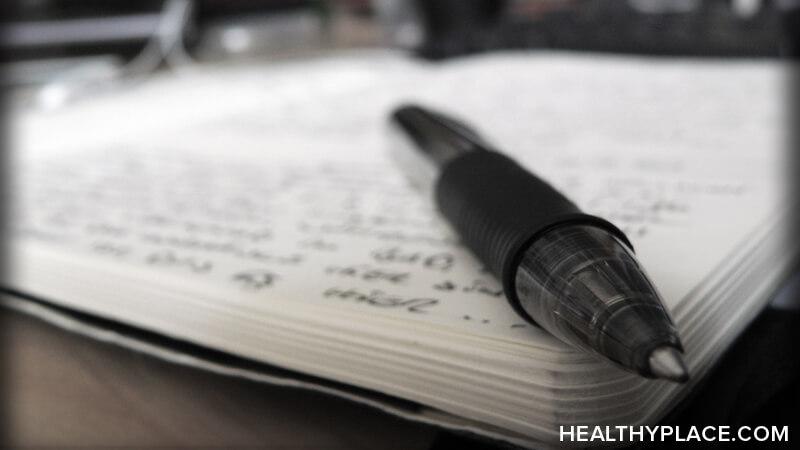Tips for Keeping a Self-Harm Diary

For some people, journaling can be a useful tool with which to process emotions and experiences related to self-injury and recovery. These tips for keeping a self-harm diary will help you create a helpful habit that you can use to support your healing process.
Maintaining a Self-Harm Recovery Diary
I've been journaling since I was five, but that doesn't mean I was always "good" at it. Keeping a diary, self-harm-related or otherwise, is a habit many find difficult to maintain on a regular basis. To be fair, creative writing isn't for everyone, but if you think journaling might be a good outlet for you, here are some tips for writing more regularly.
First, choose the form that speaks to you. Some people prefer handwriting, while others like to type. You may also want to try voice memos or even a video diary if you have an easily accessible, safe, private setting in which to record your entries. If you're not sure which to use, play around with different options until you discover which feels most comfortable and natural.
Whatever form it takes, try to keep your diary handy. Smaller format journals can easily be tucked into travel bags, backpacks, purses, and pockets. Similarly, you can store a digital diary online or in cloud storage; that way, you'll be able to access it from multiple devices, including your phone as well as tablets or computers. Keeping your diary within arm's reach means you'll be able to update it whenever you need to, even when you're out and about. (Use this tip with discretion, however; if you have reason to worry about someone accessing your diary while you are out—at school or work, for example—it might be safer to leave it in a secure location at home.)
If you don't want to carry the whole diary with you, consider using a type of journal to which you can easily add extra pages (such as a binder) and just keep some blank paper with you instead. For electronic diaries, you can simply type something into a memo and copy it over to the main file later.
If you're having trouble remembering to update your self-harm diary (if, for example, your goal is to write in it on a set schedule, such as every day), try setting an alarm as a reminder. Or, if you have someone with whom you are comfortable speaking about this, ask this person to check in with you now and again to keep you accountable.
If, when you sit down to write or record an entry, you feel absolutely unmotivated to do so, consider whether the way in which you're journaling is right for you. Don't force yourself to stick to a format that doesn't suit you. If regular "Dear Diary" entries aren't working for you, consider a different approach, such as using fiction to reframe your experiences or poetry to work through different emotions. You can even draw or paint instead of writing if you choose.
It's your diary; it's up to you how you want to use it.
Keeping Your Self-Harm Diary Private
One barrier that may be keeping you from starting a self-harm diary is the issue of privacy. If you have family members who you don't trust to respect your boundaries or are worried about fellow students or coworkers discovering your journal (and maybe even using it against you), it may seem safer not to try.
But there are ways to keep your diary private if it's important to you to try keeping one as part of your recovery process. Consider the following tactics:
- Hide your diary in a secure location or keep it under lock and key (if it is a physical journal).
- Disguise your diary as something else with a fake file name (if it is digital) or a false book cover (if it is physical).
- Set a password and change it regularly (if it is a digital journal).
- Use a secret pen name or username no one will recognize (for online journals).
- Make sure to log out and clear your cache and history after every session (for online journals).
- Keep the first page blank or include a warning asking the reader not to continue reading.
- Write in a code only you know.
- Destroy your entries after creating them.
That last point should be considered a last resort. Reviewing your entries later on in your self-injury recovery journey can yield helpful insights into the progress you've made and can even help you identify triggers you may be overlooking. However, if you feel you must delete your entries to maintain your privacy, do so—destroying them does not reduce the value of creating them in the first place. For some people, destroying them may even be cathartic—a symbolic way of "letting go" of difficult past experiences.
If you have any additional tips to share that will help others maintain their self-harm diaries, or if you have questions or concerns about maintaining your own, please feel free to leave a comment below.
APA Reference
Kim Berkley
(2021, December 9). Tips for Keeping a Self-Harm Diary, HealthyPlace. Retrieved
on 2026, March 1 from https://www.healthyplace.com/blogs/speakingoutaboutselfinjury/2021/12/tips-for-keeping-a-self-harm-diary